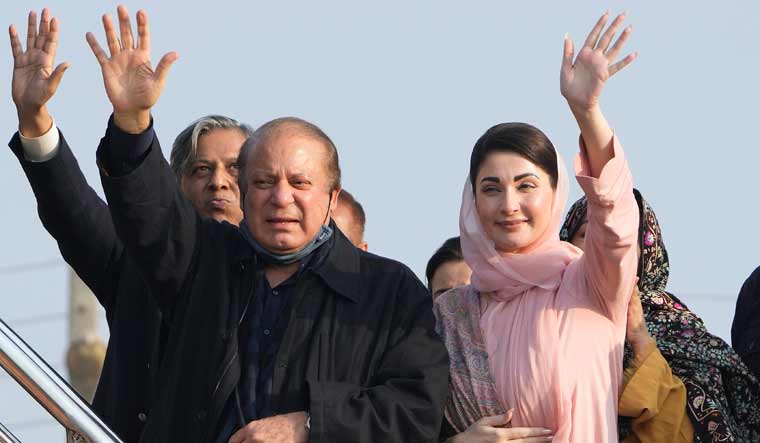Over 128 million Pakistanis will vote on Thursday to elect their representatives for the National Assembly, and four provincial legislatures in an election marred by militant attacks, crisis and a deeply polarised political environment.
The voting will be held from 8 am to 5 pm for 266 seats in the 336-seat National Assembly. The remaining 70 are reserved seats. While 60 are for women, 10 are for non-Muslims and would be allotted according to the strength of each party in the house.
The main contests are likely to be between the candidates backed by jailed former prime minister Imran Khan and the Nawaz Sharif-led Pakistan Muslim League (PML-N). Khan's candidates are facing the electoral battle without the party symbol and name after the election commission banned PTI from using it on the technical grounds that it did not hold an internal leadership election.
Others in the fray include Bilawal Bhutto Zardari's Pakistan People's Party. The 35-year-old son of former premier Benazir Bhutto was the foreign minister with the PML-N-PPP coalition government which ruled Pakistan for over one year after the ouster of Imran Khan.
 Pakistan's former Prime Minister Nawaz Sharif, center, and his daughter Maryam Nawaz, right, waves to their supporters as they arrive to address an election campaign rally in Hafizabad |AP
Pakistan's former Prime Minister Nawaz Sharif, center, and his daughter Maryam Nawaz, right, waves to their supporters as they arrive to address an election campaign rally in Hafizabad |AP
While unofficial results would be out a few hours after voting closes at 5 p.m., local media reports claim that the PML-N is likely to emerge as the single largest party and the PPP as a distant second. Nawaz Sharif has been projected as the future prime minister if the PML-N manages to secure an absolute majority. Pakistan's former premier Shehbaz Sharif has made it clear that his brother Nawaz Sharif would become prime minister if his party gets the majority. If it is a split mandate, the decision about a new leader would be taken after talks with coalition partners.
However, in Pakistan, the Army holds a major sway and could become the deciding factor. In Pakistan, which was under martial rule for half its existence, the Army is the major power. It pulls the strings and allegedly picks the Prime Minister depending on his willingness to cooperate.
"The deciding factor is which side the powerful military and its security agencies are on," Abbas Nasir, a columnist told Reuters. "Only a huge turnout in favour of PTI can change its fortunes." Many believe Nawaz Sharif is being backed by the generals.
Economic crisis, terrorism
Pakistan is in severe economic turmoil and needs a stable government for recovery. "Historically, engineered electoral exercises have not produced stability," Nasir said. "The country's economic challenges are so serious, grave, and the solutions so very painful that I am unsure how anyone who comes to power will steady the ship."
It was the $3 billion bailout from the International Monetary Fund (IMF) that saved the country from a sovereign default last year and Pakistan desperately needs an extended programme as the lender's support ends in March.
Militancy is also a huge threat to Pakistan's stability. Raising concerns over security, two explosions rocked Pakistan's southwestern province of Balochistan on Wednesday, killing 26 people and wounding dozens. Over the past 18 months, several such attacks have been reported, including by the Tehreek-e-Taliban Pakistan (TTP), a militant group which reorganised in Afghanistan after the Taliban returned to power there in 2021. Islamabad's limited fiscal space limits its ability to fund another sustained military operation is helping the group. Besides TTP, an ethnic-nationalist Baloch insurgency in the southwest too is a headache for Pakistan.


